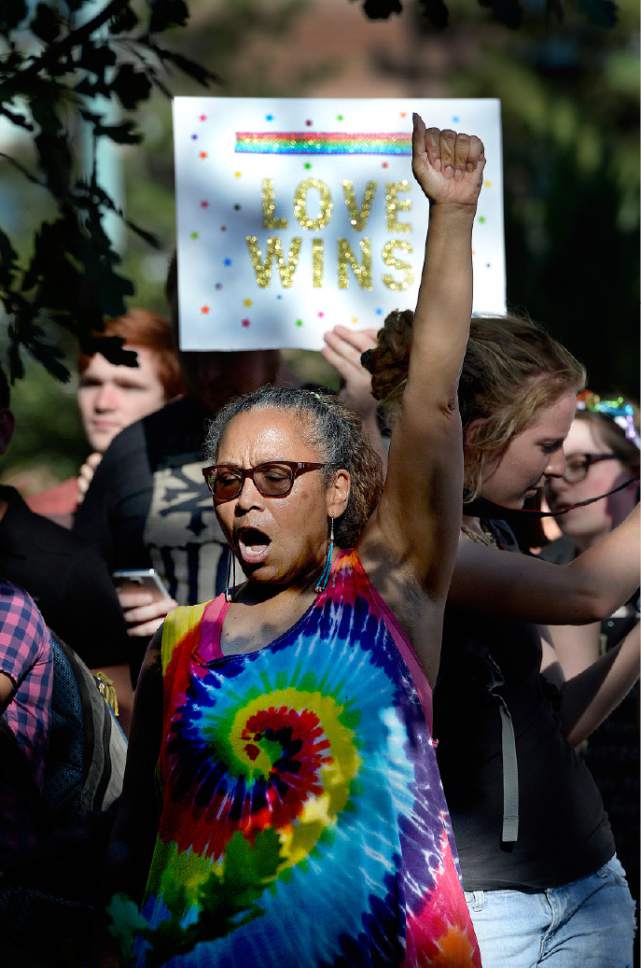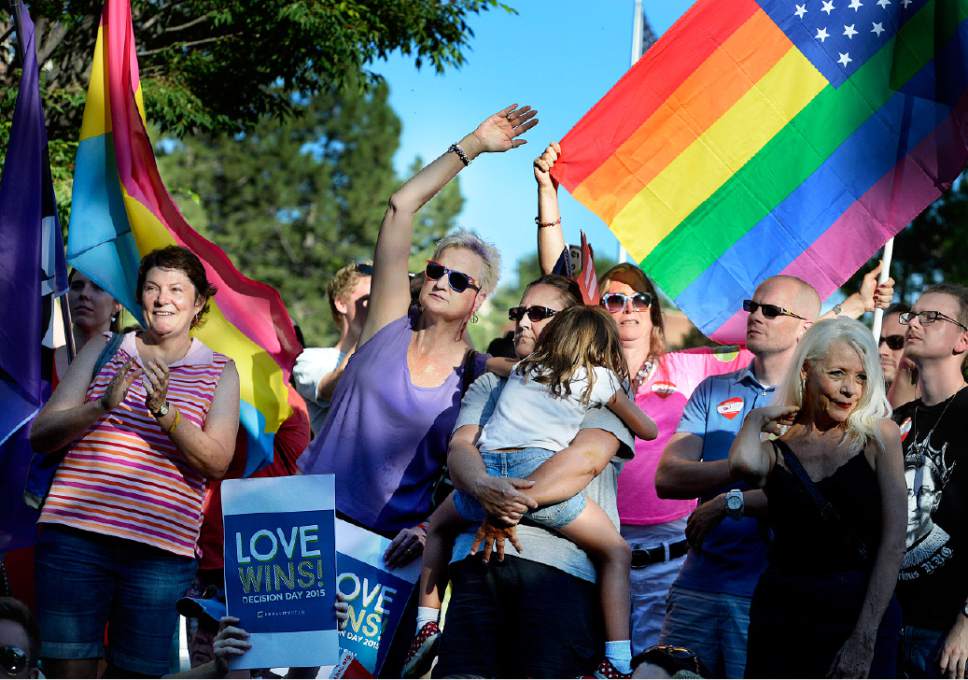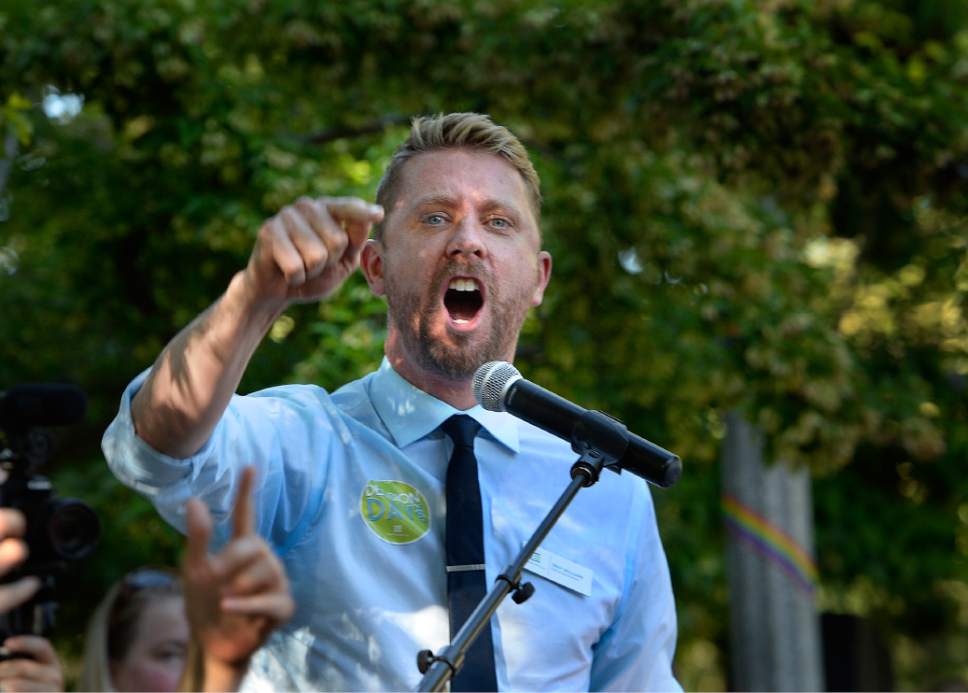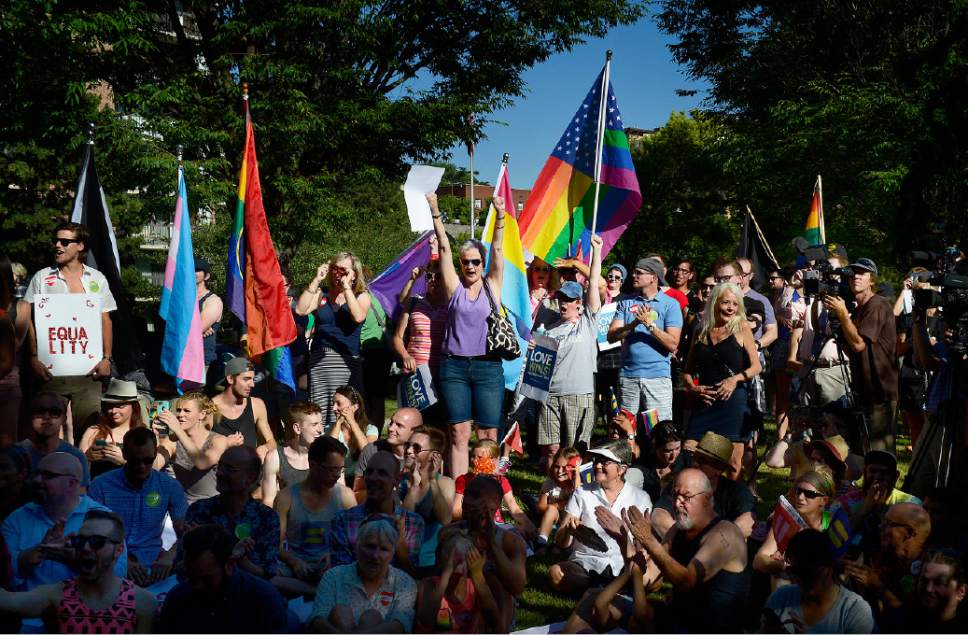This is an archived article that was published on sltrib.com in 2015, and information in the article may be outdated. It is provided only for personal research purposes and may not be reprinted.
The Supreme Court's landmark ruling legalizing same-sex marriage across the country has some Utah lawmakers looking at doing away with state-sanctioned marriage altogether and has one legislator warning it could create a slippery slope to people marrying animals.
Even before the ruling, one lawmaker had a bill drafted ending the practice of the government issuing marriage licenses. Under the proposal, the state would recognize civil contracts between partners while churches would perform marriages.
The bill would be a massive rewrite of state law, which refers to marriage scores of times throughout the code. Neither the bill nor the name of the lawmaker who asked that it be drafted has been publicly released.
A similar bill passed the Alabama Senate last year by a near-unanimous majority, but was not considered in the state House.
The Libertas Institute, a think tank influential among the Utah Legislature's libertarian members, said there is no reason for government to license marriage, which can just as easily be officiated by churches or formalized through a contract between the parties.
"The long-standing violation of the sacred union of marriage — encouraged by those looking to shape society to match their vision — needs to be fixed," said Libertas President Connor Boyack.
Rep. Jake Anderegg, R-Lehi, said he agrees with the idea of getting government out of marriage and confirmed a colleague has had a bill drafted, but declined to say who.
"I would personally like to see the state out of the marriage-license business," Anderegg said, "but then I'd like to see the state out of the liquor-distribution business, too."
Sen. Jim Dabakis, D-Salt Lake City, the Legislature's only openly gay member, chalked it up to sour grapes in the aftermath of the historic ruling.
"I'm a Democrat and I am gay and I know in Utah what it's like to lose, so these guys, they might be saying things in this moment as this is happening that they may have second thoughts about," he said. "The idea of destroying marriage entirely because gay people can get married now would probably not withstand the scrutiny of some clear thought away from the decision."
Gayle Ruzicka, president of the Utah Eagle Forum, also opposed the notion of ending state-sanctioned marriage.
"It's a very bad idea to get rid of the marriage license. I don't think we should let things that happened today and the disappointment change the rule for us," she said. "There's a reason for the marriage license. It's a protection for children and families. ... Over the years, [couples] have gotten a marriage license so they can feel secure in their relationships and their marriage, that legal unit, so children could be taken care of and not abandoned."
Cliff Rosky, a University of Utah law professor who is on the board of Equality Utah, an LGBT advocacy group, compared the idea of shutting down marriage to the segregated South, where public schools and swimming pools were closed down after the courts ruled that they had to integrate.
"I regard that as a sad chapter in the history of the United States, and I don't think there's a strong movement [in that direction today]," he said. "It would be one thing if America came together and recognized that unmarried and married people are equal and should be treated as equal under the law. But that's not the spirit of this. The spirit is: If they can't have it, then no one can."
Anderegg also said the court's 5-4 decision makes clear that same-sex marriage is now the law of the land — as it has been in Utah for much of the time since December 2013 — but he warned that the court's decision puts the nation on a trajectory to legalizing other prohibited marital practices, including polygamy and bestiality.
"The question remains: At what point does the legal reasoning and the logic behind the legal argument, taken to its ultimate conclusion, at what point does that open up polygamy, bestiality and these so-called decency laws that we have had traditionally on the books for a long time now?" he asked. "At what time are they going to do that? 'I love my pet so therefore I should be able to marry my pet.' I know that's a ridiculous argument but there are some who would do that."
Utah's historic ban on polygamy has recently been challenged in court and a part of the bigamy statute struck down. The state is appealing the federal court ruling. State law still bars having sexual relations with or marrying animals.
Rosky said it is absurd and demeaning for Anderegg to try to lump gay Americans in with animals that cannot consent.
"He's comparing same-sex relations between two consenting adult human beings to a relationship between a human and an animal, and that's insulting. It is. It's insulting to gay and lesbian people first and foremost, and it's just insulting to the intelligence of the average American," Rosky said. "Today is a day to celebrate the equality of same-sex couples and the fact that all Americans enjoy the freedom to marry. It's not a day to compare gay people to pets."
Gov. Gary Herbert said he was disappointed that the Supreme Court usurped states' rights to redefine marriage as it had been spelled out by Utahns.
"States should have the right to determine their own laws regarding marriage," Herbert said in a statement. "Clearly, the majority of the justices disagree, and their decision provides finality with respect to the law."
Utah Attorney General Sean Reyes said lingering questions remain about how Friday's decision will be implemented by various state agencies and those issues will need to be addressed by the governor and the Legislature. He said lawmakers have already begun to balance religious freedoms and protections for the gay and lesbian community "in a significant way" with legislation passed earlier this year.
The Legislature approved a measure that prohibits housing and employment discrimination against lesbian, gay, bisexual and transgender Utahns but exempted various religious institutions and church-owned businesses.
Another law allows clerks to refuse to perform same-sex marriages if it violates their beliefs, as long as someone else is available to perform the ceremony.
"Should such freedoms and protections come under constitutional challenge," Reyes said, "our office will do its duty and defend them just as we defended Amendment 3 [banning same-sex marriage] and related laws."
At the same time, Reyes said, the resolution of the legal fight provides a chance for the state to resolve differences.
"While people of goodwill on all sides of this issue have been at times divided and conflicted," he said, "we have an opportunity to come together again as equal citizens of this great state and nation."
Twitter: @RobertGehrke











